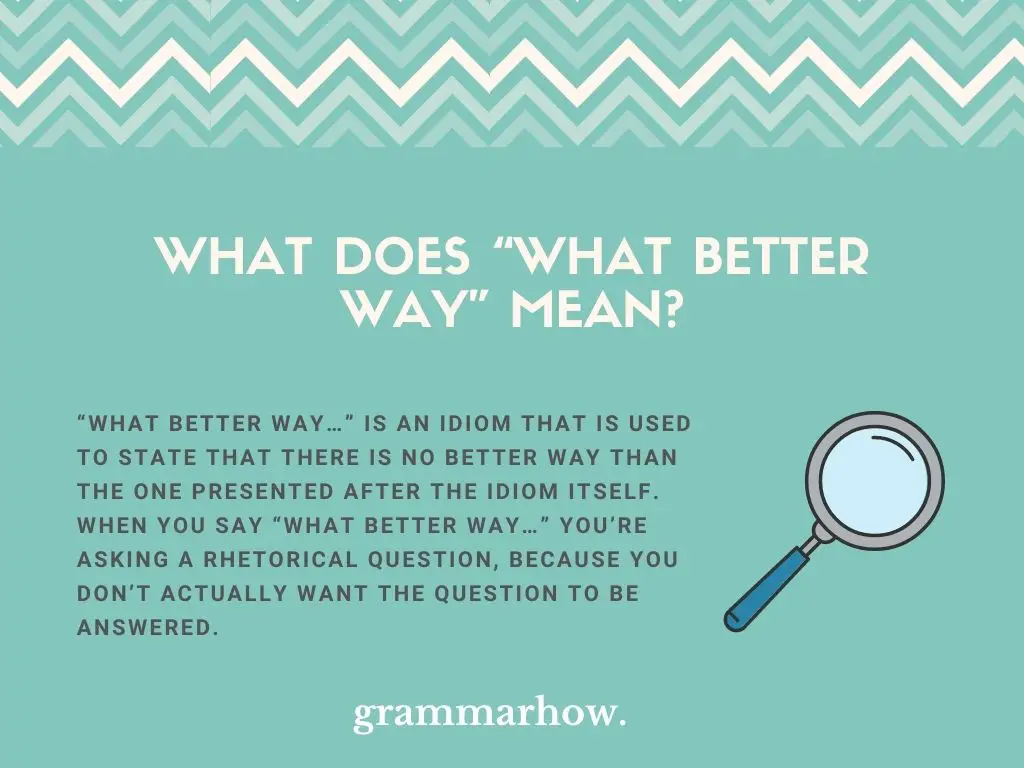Often in the English language, you’ll find idioms and expressions that don’t have an immediately apparent meaning. This can be the case with “what better way…” which is a very common idiom that one might find. If you’re wondering what this expression means, you’re reading the right article.
What Does “What Better Way” Mean?
“What better way…” is an idiom that is used to state that there is no better way than the one presented after the idiom itself. When you say “what better way…” you’re asking a rhetorical question, because you don’t actually want the question to be answered.

A rhetorical question is a question that you already know the answer to, and you’re asking to make a point rather than to seek an answer. “What better way…” is an example of this.
The great thing about “what better way” is that, unlike other rhetorical questions, the format will let your audience know that it’s a rhetorical question from the start, with little room for error.
Using “what better way” is a charming way of stating that you don’t believe there is a better way to do something than what you’re already saying.
“What better way” is a sentence that is appropriate for both formal and informal contexts. Of course, it all depends on what you specifically use it for, because it could be formal or informal.
However, there is nothing about the expression inherently that binds it to formal or informal situations, and it’s all just about how you personally use it.
How to Use “What Better Way” in a Sentence
Using “what better way” in a sentence is easy. You simply have to start the sentence with “What better way” and then follow it up with what you want to accomplish and what you’re doing to accomplish it. This structure can be easily learnt.
Therefore, the structure for the idiom would be something like “What better way to X than to Y”, where you’re saying that Y is the best way to do X.
Once you have mastered the format for this idiom, you can use it in dozens of different contexts to rhetorically ask if there is a better way to accomplish something than what you’re already saying.
An important part of the idiom’s structure is that you have to start the sentence with “what better way”. Variation on this format is limited and might end up confusing your audience, so be careful.
Here are some example sentences that you can use if you’re unsure of how to use the phrase:
- What better way to celebrate your accomplishments than to do a huge party?
- What better way to celebrate your upcoming marriage than taking a picture?
- What better way to establish this diplomatic link than having lunch together?
- What better way to cap off your school year than getting an A on your thesis?
- What better way to spend the day than by studying this weekend?
- What better way to start the day than by having breakfast?
- What better way to enjoy it than in a huge horse-drawn carriage?
- What better way to solidify your chances than by submitting to the contest twice?
- What better way to make up with her than by making a fantastic dinner?
- What better way to celebrate your graduation than by going to the beach for a day?
What Better Way Than or Then?
The correct phrase to always use is to say “what better way than”. “What better way then” doesn’t make grammatical sense, because “then” is used to establish causality, which “what better way” does not try to accomplish. You should always say “what better way than” when using the idiom.
This is a very understandable mistake to make, since “than” and “then” are in fact very similar words. However, it’s one that you should always avoid, because “what better way then” makes no sense.
“What Better Way” – Synonyms
“What better way” is an idiom that uses a rhetorical question to establish that something is the best way to do something else. However, there are other ways you can establish this in the English language. Here are some of those ways:
- There is no better way
- The best way
- There isn’t another way
- The only way
- The greatest way

Martin holds a Master’s degree in Finance and International Business. He has six years of experience in professional communication with clients, executives, and colleagues. Furthermore, he has teaching experience from Aarhus University. Martin has been featured as an expert in communication and teaching on Forbes and Shopify. Read more about Martin here.
